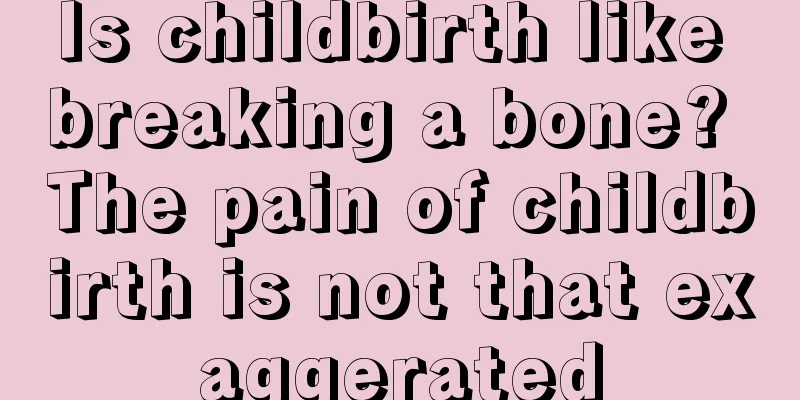The impact of calcium deficiency on children The impact of calcium deficiency on children's teeth

|
Children usually need a lot of nutrients in the process of growing up. If they do not absorb enough nutrients, they will easily suffer from malnutrition or even calcium deficiency. So let's take a look at the impact of calcium deficiency on children and the impact of calcium deficiency on children's teeth. The impact of calcium deficiency on childrenLong-term calcium deficiency will affect the baby's bone development. It is easy to cause slow growth and rickets, and the baby will twitch involuntarily when sleeping, which will also affect the quality of sleep. Some neurological symptoms may occur, such as irritability, night terrors, and typical symptoms of occipital baldness. It is recommended to take oral medication, or drink more pure milk and yogurt. Let the baby get more sun. In addition, in severe cases, bone changes may occur, which may be manifested as enlargement of the anterior fontanelle, delayed closure, and softening of the skull. Usually, let the child eat more fruits and vegetables and other foods high in vitamins, eat more dairy products, soy products, eggs, lean meat, etc. Eat less snacks and other foods high in lead. The impact of calcium deficiency on children's teethIf calcium nutrition is deficient, teeth, like bones, are prone to decalcification and various diseases. When osteoporosis occurs in human bones, it can be seen that the person is shorter, has a hunchback, and is prone to fractures. Corresponding changes will also occur when teeth are decalcified. Decalcification can aggravate the atrophy of the jaw and alveolar cusps, making the alveolar socket shallower. In addition, the atrophy of the gums weakens the fixation of the teeth, and eventually the teeth become loose and fall out. Due to decalcification, the overall hardness of the cementum decreases, causing the teeth to wear easily. Even daily brushing can cause wear, forming wedge-shaped wear on the neck of the teeth, and even fractures. At the same time, due to the atrophy of the periodontal tissue, the periodontal membrane becomes thinner, the roots are exposed, and the interdental spaces become larger, which weakens the auxiliary fixation of the teeth, aggravates the looseness of the teeth, and makes them more likely to fall out. What will happen if a child is severely calcium deficient?Severe calcium deficiency in children can cause rickets, and also cause excessive sweating on the pillow and head, especially at night when sleeping, which can cause irritability, and also cause pigeon chest and O-shaped legs. Most of the calcium deficiency in children is caused by excessive growth, or it may be caused by too little calcium intake in the usual diet. In daily life, children can eat more foods with high calcium content, such as milk and soy products. Children will have difficulty falling asleep, waking up easily at night, and restless sleep. Since the quality of sleep of children cannot be guaranteed, the growth and development of children will be affected. Secondly, children will have symptoms of hyperhidrosis, which is generally not directly related to the weather and the amount of clothes the child wears. Infants with severe hyperhidrosis may have baldness on the back of the head. Furthermore, severe calcium deficiency may also cause some bone changes, such as pigeon chest, funnel chest, beaded ribs, O-shaped legs, X-shaped legs, etc. Older children may experience leg pain and leg cramps. What to do if your child is seriously calcium deficientSevere calcium deficiency in children can easily affect their growth and development, and some can easily lead to pigeon breasts. Be sure to pay attention to timely treatment, pay attention to diet, strengthen nutrition, eat more lean meat ribs, milk, fish, shrimp, it is recommended to use cod liver oil to promote calcium absorption, take Diqiao tablets or Calcium Supplement for treatment. After a month, check the recovery situation repeatedly. If the absorption is not good, this still needs to be injected with vitamin calcium. This is better for absorption. Pay attention to regular check-ups to avoid affecting the child's physical development and causing deformities. If the child is calcium deficient, parents can change the child to eat more foods with relatively high calcium content. At the same time, you can also give the child more foods rich in vitamin D, which can promote the body's absorption of calcium. Usually, you can also take the child to do some outdoor activities, get more sun, and enhance the child's own immunity. |
<<: How to quickly reduce a baby's fever? How long does a baby's fever usually last?
Recommend
What to do and how to treat neonatal adrenal hemorrhage
The incidence of neonatal adrenal hemorrhage is a...
What should I do if my baby is afraid of water? Why is my baby afraid of water?
When I was bathing my baby a few days ago, I disc...
What are the signs of an unexpected pregnancy? How to abort an unexpected pregnancy?
Unexpected pregnancy often catches many young mot...
What are the causes and symptoms of prenatal depression? How to self-diagnose prenatal depression symptoms?
After many women become pregnant, they find it di...
Can a 10-month-old baby eat dumplings? What kind of dumplings are good for babies?
A ten-month-old baby can already eat a variety of...
How to cultivate good hygiene habits in children
Children need to learn a lot of different knowled...
What name can be given to a baby boy born at noon?
Have you ever participated in naming your baby? T...
What are the symptoms of dengue fever in children and how to prevent it
Dengue fever is an acute infectious disease sprea...
Is it easier for newborns to get bloated at night by breastfeeding or bottle feeding?
When the baby goes to sleep at night, he/she gets...
When do infants and young children develop their abilities? Three major development indicators
Infants and young children basically start to dev...
How to prevent postpartum depression and how to take care of the emotions of pregnant women
Nowadays, more and more mothers suffer from depre...
Can electric blankets be powered 24 hours a day? Why is the light on the electric blanket not heating up?
Pregnant women can also use electric blankets, bu...
Should I sleep in separate beds after pregnancy? It is not necessary for my husband to do these things
It is not necessary for the husband to do the fol...
When does a woman's early pregnancy reaction begin?
Some women are very worried about whether they ar...
Can I still breastfeed after an abortion during lactation? What should I pay attention to?
Can a mother who accidentally gets pregnant durin...









